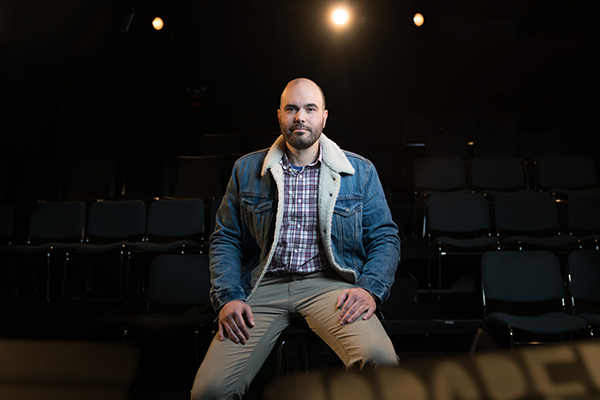The Bus Stop Theatre opened in 2003 at 2203 Gottingen Street (there actually is a bus stop out front, 6779). “Howard Beye bought an old shut-down drugstore and had what everybody thought was this crazy dream to turn it into a theatre,” says Sébastien Labelle, the executive director of The Bus Stop Theatre Co-op, sitting in the venue’s window. In the ensuing years, through multiple artists at its helm, the Bus Stop has established itself as a vital performance venue in Halifax, which is just about out of performance venues these days. “It’s a place where you come and see really exciting works of art by local artists as well as touring artists, nationally and internationally, and that’s across disciplines: Theatre, dance, music, film, stand-up, improv, even magic shows,” says Labelle. “You name it, it happens here.”
But now it’s in trouble: The building’s owner, Walk-eh Enterprise Limited (its president Clare Waque is heavily involved in the co-op and likely bartending tonight), can no longer hold onto it. “They need to put it up for sale, but have given us right of first refusal on the sale, because it’s their desire to see this continue as a theatre,” says Labelle. “We all know that if the co-op isn’t going to buy the building, in all likelihood it will be a developer who will have no intention of preserving this as a venue, unless it’s under a very different mandate.”
A letter-writing campaign is now underway to appeal to all three levels of government in support of the Bus Stop’s $6.5-million proposal to renovate and build an additional performance and rehearsal studios in the empty lot behind the structure.
“Our challenge is coming in the middle of a general crisis in the performing arts community. And also in the non-profit sector in general,” says Labelle. “Which is the ability to find accessible, affordable space; space that can be used for emerging artists and lots of different groups.”
Last year saw the loss of both The Living Room on Agricola Street, now a doggy day care; and The Waiting Room on Almon Street, now a musty parking lot awaiting development. Those venues closing “exacerbated really a crisis that has been on the slow burn for a really, really long time,” says Labelle, gazing out at the shuttered Company House space directly across the street. “To be honest The Living Room was only used because there was nothing better to use. I mean it was a shitty space—even Theatre Nova Scotia recognizes that. But they kept it open because there was simply nowhere else.”
A lot of competing venues would welcome becoming the only game in town, but for the Bus Stop, it’s added strain to an already strained situation. “We’re busier than ever,” says Labelle. “It’s great, but it’s a double-edged sword; we don’t really have the capacity to meet that kind of demand.”
Late last fall, nearly $10 million in government funding was announced for The Culture Link, a downtown arts hub that will bring together a number of cultural organizations under one roof alongside a proposed cinema, rehearsal studios and production offices. Stephen McNeil’s government, which slashed arts funding in 2015, is not exactly known as arts-friendly, and something like the Bus Stop might look like small potatoes against a huge project like the Link.
“Strategically the timing is not great for us. And having two arts projects come with an ask in a similar time frame is tough,” says Labelle. “The Link isn’t the only one—there’s the Khyber, there’s Shakespeare By The Sea, there’s all these other arts organizations. Everybody is going to government and saying ‘Things are falling apart.’
“The needs and interests that are served by The Culture Link have very little overlap with the needs and interests served by The Bus Stop Theatre. They have different mandates and serve different populations and industry circles,” he continues. “So they serve different functions in the arts community.”
A private capital campaign is in the works in addition to funding asks, but the co-op needs to buy the building first, and fast.
“We’re asking for the general public to echo our message and lend their own voices to express the importance of The Bus Stop Theatre to them personally and to their community, their neighbourhood, their city, their province,” says Labelle. “And say that this is really important, and we need to act now so that we can secure what we have already, and take advantage of an opportunity that’s presented itself to really build up on it, and the ability of the Bus Stop to answer its own mandate.”
To make it real easy for you, there’s a support-letter template and list of emails for ministers, councillors and MLAs here.
















